Guest Speaker: On Sale Now! Apple Baking Advice
 A primer on baking with apples, from someone who should know (or at least knows whom to ask).
A primer on baking with apples, from someone who should know (or at least knows whom to ask).
By Wendy Brannen
I know that Bed, Bath & Beyond is a great resource for purchasing household goods—and for 20% off, at that, with those ubiquitous coupons—but until recently I didn’t realize the big-box retailer has an excellent blog.
“Above & Beyond” blipped on my radar when a fun and friendly freelancer called to ask me about baking with apples for a consumer blog story. That’s also when I realized, “You know, I work for the U.S. Apple Association. I really should know more about baking with apples!” Thus, I tried to go “above and beyond” to find out a little more from a handful of subject-matter experts.
Jane Bonacci is a dear friend and food blogger from San Francisco who has a tsunami-sized love of food—and creating good food recipes. I love her advice for a simple-but-saucy baked apple. (No crisps or crumbles needed here, folks!) Says Jane, “If you want to make baked apples, leave them whole, peel them about halfway down from the top, leaving the bottom half with peel on for structure. Remove the core and fill the hole with hard sauce—Oh, my!”

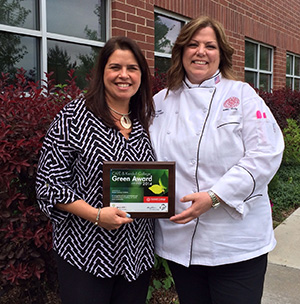 For a seventh year, Kendall College will sponsor the CAFÉ/Kendall College Green Award, the industry’s premiere program lauding successes of culinary-arts and hospitality-management programs that practice and train students in ecological responsibility.
For a seventh year, Kendall College will sponsor the CAFÉ/Kendall College Green Award, the industry’s premiere program lauding successes of culinary-arts and hospitality-management programs that practice and train students in ecological responsibility. The annual menu-trends survey of chefs conducted by the National Restaurant Association discovered that culinary cocktails, doughnuts and brown rice are gaining in popularity among customers, while kale salads, housemade sodas and hybrid desserts are cooling down.
The annual menu-trends survey of chefs conducted by the National Restaurant Association discovered that culinary cocktails, doughnuts and brown rice are gaining in popularity among customers, while kale salads, housemade sodas and hybrid desserts are cooling down. 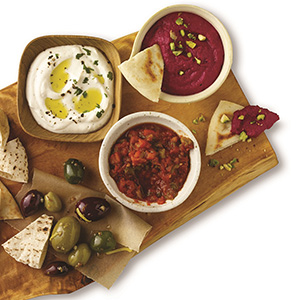 15th-annual report highlights top tastes driving the future of flavor and menu innovation.
15th-annual report highlights top tastes driving the future of flavor and menu innovation.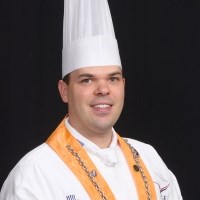 AI Pittsburgh instructor Culp helped Culinary Team USA place third overall in Luxembourg, while U.S. chef-educators in individual competition represented their nation well.
AI Pittsburgh instructor Culp helped Culinary Team USA place third overall in Luxembourg, while U.S. chef-educators in individual competition represented their nation well.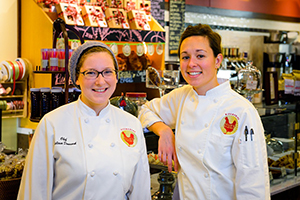 An award-winning pastry chef and talented baker and cake artist bring their seasonally inspired, artisanal confections to life at this Parisian-style Rhode Island bakery.
An award-winning pastry chef and talented baker and cake artist bring their seasonally inspired, artisanal confections to life at this Parisian-style Rhode Island bakery. ’Tis the season, says Chef Weiner, who among other things suggests a “Build a Gingerbread House” station to raise needed funds for programs.
’Tis the season, says Chef Weiner, who among other things suggests a “Build a Gingerbread House” station to raise needed funds for programs. In his final installment in a series on student assessment, Dr. Mayo says it is increasingly important to explain to students the criteria we use in grading. Not only does doing so make our jobs easier, but it is only fair to tell students ahead of time how they are going to be evaluated.
In his final installment in a series on student assessment, Dr. Mayo says it is increasingly important to explain to students the criteria we use in grading. Not only does doing so make our jobs easier, but it is only fair to tell students ahead of time how they are going to be evaluated.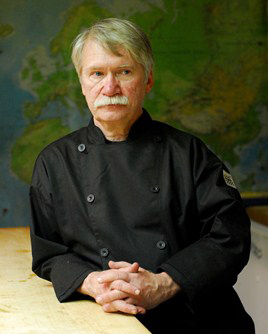 Employers seek graduates who follow directives, have a strong foundation of technical skills and enthusiastically respond, “Yes, Chef.” Yet knowing the “why” and “how to” is as important a skill as the actual process of completing a task.
Employers seek graduates who follow directives, have a strong foundation of technical skills and enthusiastically respond, “Yes, Chef.” Yet knowing the “why” and “how to” is as important a skill as the actual process of completing a task. A free classroom offer to teach students why menuing domestically raised fish and seafood is an important way to keep both customers and the bottom line happy.
A free classroom offer to teach students why menuing domestically raised fish and seafood is an important way to keep both customers and the bottom line happy.